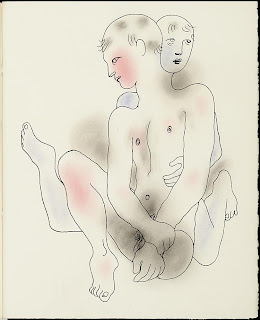 Today is the birthday of Jean Cocteau. The poet, novelist, dramatist, designer, boxing manager, playwright, artist and filmmaker was born on July 5, 1889.
Today is the birthday of Jean Cocteau. The poet, novelist, dramatist, designer, boxing manager, playwright, artist and filmmaker was born on July 5, 1889.
Cocteau was born into a wealthy family in Maisons-Lafitte. He left home at 15 and published his first volume of poems, Aladdin's Lamp, at the age of 19. In 1915 Cocteau met Pablo Picasso, who became a lifelong collaborator and friend. Along with the poet Guillaume Apollinaire, Cocteau was a witness at Picasso's first wedding. In 1917 Russian ballet-master Sergei Diaghilev commissioned Cocteau to write the book for a ballet that became the avant-garde milestone Parade, with sets by Picasso and music by Erik Satie. Parade has been hailed as one of the symbolic beginnings of modern art, though audiences at the time were appalled. "If it had not been for Apollinaire in uniform," wrote Cocteau, "with his skull shaved, the scar on his temple and the bandage around his head, women would have gouged our eyes out with hairpins." After serving as an ambulance driver in WWI, and publishing several books of poetry about his experiences, he turned to writing deeply disturbing psychological novels, among the best known of which is Les Enfants Terribles, and collaborated on a number of plays and operas.
After serving as an ambulance driver in WWI, and publishing several books of poetry about his experiences, he turned to writing deeply disturbing psychological novels, among the best known of which is Les Enfants Terribles, and collaborated on a number of plays and operas.
In the 1930's Cocteau began to make films, the first of which, The Blood of a Poet, was an exploration of his private mythology. As the result of a bet with the newspaper Paris-Soir, Cocteau completed the itinerary imagined by Jules Verne in Around the World in Eighty Days, depicting his travels in the film My First Voyage. Over 20 years Cocteau produced such cinematic masterpieces as Beauty and the Beast and Orphée. He continued leading an active life until 1953 when ill health forced him into semi-retirement. In his last decade Cocteau worked in a wide variety of graphic arts. At the age of 70 he painted frescos in the town hall of the French town of Menton and in the chapel of Saint-Pierre at Ville-franche-sur Mer. Cocteau's mural at Notre-Dame de France in London was finished in 1960.
On October 11 1963, Cocteau was preparing a radio broadcast in honor of Edith Piaf when he heard she had died. He exclaimed: "Ah, la Piaf est morte, je peux mourir," ("Ah, Piaf has died, I can die"), had a heart attack, and died. Edith Wharton described Cocteau as "a man to whom every great line of poetry was a sunrise, every sunset the foundation of the Heavenly City."
No comments:
Post a Comment